Open Letter To Indians and Liberals Regarding Immigration and Outsourcing
Everyone including friends of India should realize there is limited time to address this problem
I mean this short blog entry as a moderate and centrist appeal to reasonable Indians and to liberals to show them the argument against Indian migration isn’t motivated by bigotry or racism, but is based on common sense. It’s bad both for the host countries but also for India and Indians, as well as for general cultural exchange. Please first consider this article:
Forney’s article reveals a bad and shocking thing: the replacement of American workers wholesale from entire industries and businesses by Indian imported workers or by outsourcing. This is a betrayal in the United States by adults of young people who they encouraged to go to university, take on debt, be responsible, study STEM. But no one who graduates now can find a job, especially in STEM. Even people with good jobs aren’t able to have options to change job or career. The arrogance of employers is accordingly very great and they feel enabled to abuse American employees. But yes there are no jobs to get in the first place for people just starting out: partly as a result of Trump’s badly-thought-out tariffs that introduced uncertainty for companies and an unwillingness to invest and to hire, partly because of the importation of (now mainly Indian) workers, and partly because of other problems in labor market regulations. Whatever hiring does exist for American citizens is in healthcare or education: 85% of new jobs in the “good” month of June 2025 were only in these two fields…in other words mostly for young women. Intelligent and enterprising young men who have done everything that was asked of them simply can’t find good jobs in 2025 or only with great difficulty. This includes graduates from elite universities.
The importation of Indian workers to replace Americans results in mediocrity and nothing working well. Forney’s article documents this, but it’s backed up by numerous other studies. American-born engineers are simply better than foreign ones, and the labor demographic replacement can only be explained by the short-term desire of employers to pay less, by employers’ desire for power over employees, and very much so also by ethnic nepotism in hiring. Indian upper or middle management will often only hire other Indians. This last is a very well documented phenomenon (see Forney’s article), which would be prosecuted if white Americans tried to do the same. In this connection, the selective enforcement of discrimination law as well as special government handouts for “disadvantaged minorities” (which includes Asians) when it comes e.g. to small business loans also explains this new situation. It is not, in other words, the free market at work. If Americans of English or French extraction, for example, tried to do what the Patel clan did in cornering the small hotel market, they would go to jail and be put out of business. When I mentioned that the government discriminates against white Americans for small business loans and preferentially gives them to Asians, many conservative and libertarian commentators refused to believe.
The mention of the Patel clan’s domination of motels is significant also because it’s one of the few publicized cases of Indian corruption in American social and economic life. But the reason for the unique publicity here is even worse: the Patels are from Gujarat, and Gujaratis are widely resented by Indians from other parts of India as a mercantile caste. That you (may) know about the Patel fraud as opposed to other fraud in other parts of the economy associated with Indians is also because the Patels are especially singled out by other Indians out of old-world clan and ethnic rivalries that have been imported to America. In this connection liberal Jews should also be aware of the great resentment that Indians often have for them as potential “high verbal IQ” competitors. I am reliably informed that Indian and Pakistani executives from the tech world were endlessly sharing explicitly antisemitic content in certain chats in the lead-up to the 2024 election. The reasons why should be obvious.
My concerns here aren’t motivated by bigotry, which I hope to show you now if you are a liberal or an Indian. Very often this is the go-to of migration proponents and their allies: to accuse those who object to mass immigration of bigotry and irrational racism. I am the opposite of a bigot when it comes to India. I love Indian culture and history, but even so I second everything Forney writes in that article: recent changes in outsourcing to India as well as arrival of new masses of Indian immigrants to America, Europe and Japan are having swift and catastrophic results both for these countries and for India. In what follows the reader should remember that Enoch Powell was also a lover of Indian culture, but didn’t therefore believe that mass migration of Indians to England was appropriate. But I want to show you for a moment that my love of Indian things is sincere.
I’ve spoken out against rampant anti-Indian bigotry by that name. But consider for a moment the reasons why I did so. I was offended that it now carries no cost and is being openly used by people who I have contempt for and consider cowardly. These are sometimes people who would never dare speak out truly dangerous-truth telling, who have no records of ability to stand up to the doxies of the liberal establishment, and who otherwise would wilt at being called “racist.” But the fact is that even lukewarm GOP and centrist grandmothers are willing openly to put their name on, yes, lurid anti-Indian bigotry, knowing it will carry no cost. That I only spoke out about it because it stopped being unsafe and is now everyday and boring is something that should concern you as an Indian or a liberal most of all.
Now about the very high regard in which I hold India and, yes, Indians…I will now prove to you that I am no enemy of India. First, you can check my record going back many years on Twitter/X. Here are examples from X:
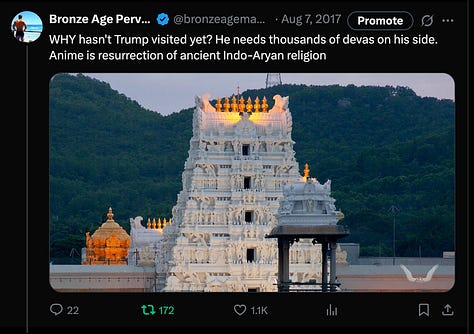
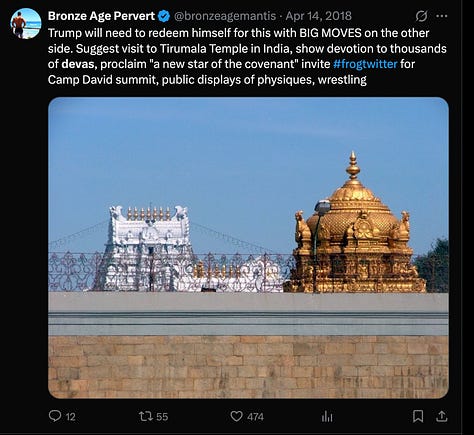
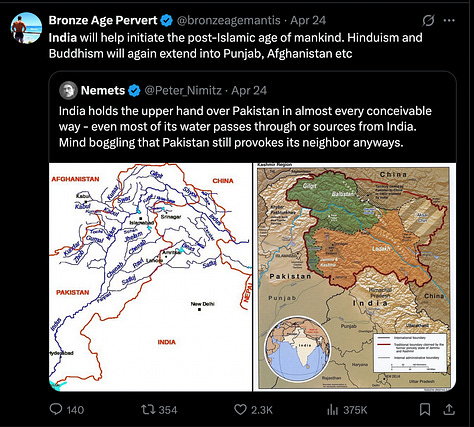


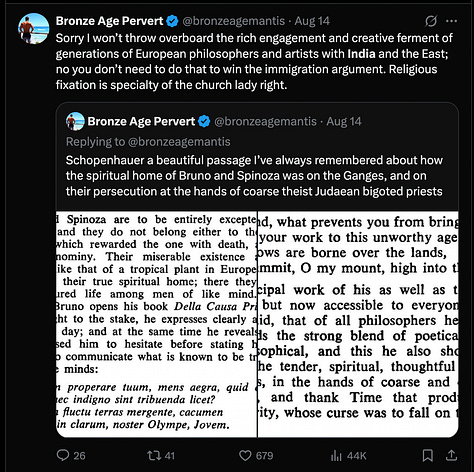
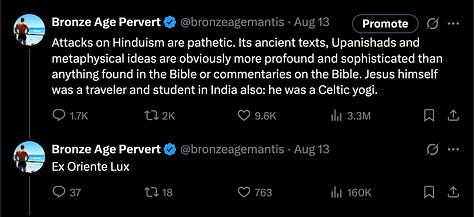

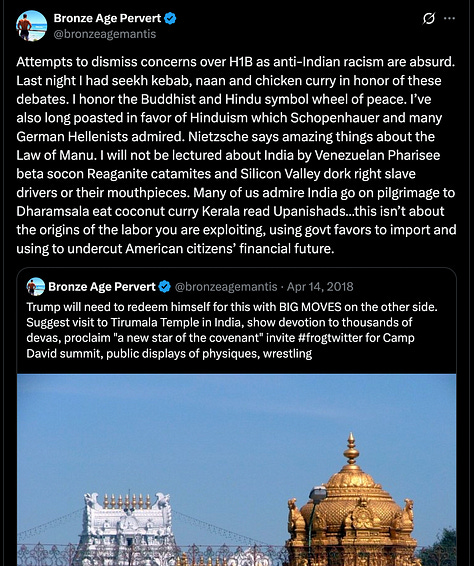
I pointed out recently on my show what anyone in professional American culture knows, that many of the more disgusting images and stereotypes spread online now have little to do with the experience of actually working especially with South Indian elites. They are often not only professional but pleasant to interact with, and also more often than not innovative and a benefit to their companies. I’d be willing to stand by all of this and will continue to even when others criticize me, and many of my friends criticized me for saying this.
One of the frequent rebuttals Indian nationalists and ethnic self-regard overhavers make against me is that I supposedly only like India because I admire the ancient Aryan invaders and their ancient Vedic religion. They say that in reality I have only hostility or racial bigotry for anything that came after that, including especially modern Indians. This isn’t true at all. While I do have a special admiration for the texts of the Vedas (one feels almost that if you go back just a few generations from the language of the Vedas, it would be nearly the same as that of the Archaic Greeks going back a few; and the common use of the same poetic formulas is very interesting to me, yes…) I also admire things about subsequent and yes, modern Indian culture. I love Indian food and will continue to, no matter what, with special love for south Indian coconut curries and many such spice things Malabar. I love Indian music and share the 1960’s Hippies’ admiration for Ravi Shankar and the like…I’ve used this kind of trance otherworldly music on my show and I’ll continue to. I don’t need to repeat my admiration of Indian philosophy and religion. In this I am merely following one of my idols, Arthur Schopenhauer.
I ask also my friends on the right to pay attention to what I will now quote from Schopenhauer. Let me use this brief article as an opportunity to show you an amazing passage. Keep in mind that these views are by no means unique to Schopenhauer, but were shared by generations of scholars, travelers, colonial administrators, and thinkers of his time, and well into the 20th Century. German Indophiles 1900-1940 were also very much a thing. Although Schopenhauer says that modern India is much degraded compared to ancient (and who, even among Indians who are honest can deny this?), nevertheless here is Schopenhauer praising not just ancient India, but the India of his time as well, and citing the experiences of Europeans serving the East India Company living there; so, a very colorful passage from Schopenhauer:
But whoever wishes to enjoy the pleasure of seeing how an English officer forty-one years ago boldly and emphatically opposed the absurd and shameless pretensions of those gentlemen [the clerics and missionaries], should read the Vindication of the Hindoos from the aspersions of the Reverend Claudius Buchanan, with a refutation of his arguments in favour of an ecclesiastical establishment in British India: the whole tending to evince the excellence of the moral system of the Hindoos; by a Bengal officer, London, 1808. With rare frankness and candour the author discusses the advantages of the Indian doctrines over the European. The short work that would run to about eighty pages would be worth translating even now; for it expounds better and more openly than any other work known to me the very beneficial and practical influence of Brahmanism, its effect in life and on the people—a report quite different from those that emanate from clerical pens which, precisely as such, deserve little credit. It agrees with what I had heard from English officers who had spent half their lives in India. For to know how jealous of, and angry with, Brahmanism is the Anglican Church, which is always so nervous on account of its livings and benefices, we ought to be familiar, for example, with the loud yelping that was raised some years ago in Parliament by the bishops, and was carried on for many months. Since the East India authorities, as always on such occasions, showed themselves exceedingly stubborn, the bishops began their barking again and again merely because the English authorities, as was reasonable in India, showed some external marks of respect for the ancient and venerable religion of the country. For example, when the procession with the images of the gods passed by, the guard and its officer turned out and saluted with drums. Then there was the furnishing of a red cloth to cover the Car of Juggernaut, and so on. This was discontinued, as also were the pilgrim-dues raised in this connection; and such steps were really taken to please those gentlemen. Meanwhile, we have the incessant fulminations of those self-styled right-reverend holders of livings and wearers of full-bottomed wigs at such things; the really medieval way in which they express themselves on the original religion of our race, but which today should be called crude and vulgar; likewise the grave offence given to them, when in 1845 Lord Ellenborough brought back to Bengal in a triumphal procession and handed over to the Brahmans the gate of the pagoda of Sumenaut which had been destroyed in 1022 by that execrable Mahmud of Ghaznavi. I say that all this leads one to surmise that to them it was not unknown how much the majority of Europeans living many years in India were at heart in favour of Brahmanism, and how they simply shrugged their shoulders at both the religious and social prejudices of Europe. ‘All this falls off like scales, whenever one has lived only two years in India’, such a man once said to me. Even a Frenchman, that very courteous and cultured gentleman, who some ten years ago in Europe accompanied the Devadassi (vulgo Bayaderes), at once exclaimed with fiery enthusiasm, when I came to speak to him about the religion of the country: Monsieur, c’est la vraie religion!’
If we go to the root of the matter, even the fantastic and sometimes strange Indian mythology, still constituting today as it did thousands of years ago the religion of the people, is only the teaching of the Upanishads which is symbolized, in other words, clad in images and thus personified and mythicized with due regard to the people’s powers of comprehension. According to his powers and education, every Hindu traces, feels, surmises, or clearly sees through it and behind it; whereas in his monomania the crude and narrow-minded English parson ridicules and blasphemes by calling it idolatry, fondly imagining that he alone is on the right side of the fence. The purpose of the Buddha Sakya Muni, on the other band, was to separate the kernel from the shell, to free the exalted teaching itself from all admixture with images and gods, and to make its pure intrinsic worth accessible and intelligible even to the people. In this he was marvellously successful and his religion is, therefore, the most excellent on earth and is represented by the greatest number of followers. With Sophocles he can say:
Even the man who is nothing is capable of gaining strength when in alliance with the gods; but I venture to gain this glory even without them.
Ajax, 767-9
On the other hand, incidentally it is extremely droll to see the cool smile of self-complacency with which some servile German philosophasters and also many precise and literal orientalists look down on Brahmanism and Buddhism from the heights of their rationalistic Judaism. To such little men I would really like to suggest a contract with the comedy of apes at the Frankfurt Fair, that is, if the descendants of Hanuman would tolerate these amongst them.
The favorable impression given by modern Indian life, and the high value placed on Indian religion in helping Europeans shed off Jewish mythology is not unique to Schopenhauer, it was something emphasized throughout the early 20th Century as well. It is present arguably at least as far back as Voltaire, who was trying to use China as an example for this same reason. The attempt to escape the fraudulence of Biblical “history” and genealogy, and in general to use the religions of the Orient to aid European men not maybe open to philosophy, but open instead to art and spirituality, to aid them in escaping the mendacious and malicious traditions of Judaean and Judaine theology (which includes modern Judaism as well as Christianity) …this is a frequent and potent vein in the thought of the European progressive and atheist right wing, of which I consider myself a descendant.
As an aside for those who would say, “look at modern India to see the results of Hinduism, versus Europe to see the results of Christianity,” I answer that a lot of other parts of the world that are Christian, even for centuries, look pretty much like India does, or worse. It’s possible both that modern India would be a lot worse were it not for Hinduism, and also that modern Europe is worse than it would have been if it had simply continued the religious traditions of Hellenism and the philosophical secularism of late antiquity instead of trying to be the “New Israel.” It’s even possible that “it is to be regarded generally as a great misfortune that the people whose former culture was to serve mainly as the basis of our own were not, say, the Indians or the Greeks, or even the Romans, but just these Jews…” as, again, Schopenhauer elsewhere says.
So I write this as a friend to India and Indians, and not colored by any bigotry against you but even the opposite. In fact you must remember that as Indians you come actually pre-branded in the West with a lot of cultural sympathy. Many of the things I’ve just talked about from 19th century German culture were, like nudism, “laundered” or filtered through the beginnings of the youth movements in California and the West in the 1950’s and 1960’s. India and Indian spirituality enjoyed a huge cultural advantage, almost as big as Japan has now, or arguably bigger. It’s not just Ravi Shankar, tikka masala, chai, yoga, as well as pilgrimages by American and European youth to India and Dharamsala…but also much of drug culture, which is for better or worse part of modern American and European pop culture…this was very heavily permeated by (popularized) Indian symbols, words, and ideas.
And yet I say everything I’ve just said to ask you this: “How is it possible to have such high good will and high regard, and yet fall off so fast and so completely?” Because although I will continue to like the things I like and will speak out about them, I nevertheless completely agree with that article by Matt Forney, and maybe even think he understates it. The Patel hotel clan in America is now your image, and it’s wiped out everything else that I said that was positive about India in people’s minds. The vehemence of public opinion is already too great to be suppressed by any measures you might foolishly hope for from government. I don’t live in America but I can confirm the most unpleasant experiences by far I’ve had in the last couple of years have been on the phone with Indian customer service for American companies. It was hell for me, and I can’t imagine what people who do live in America, and who have to deal with similar behavior in physical life or from their coworkers and bosses at their jobs. You—whether you in American government, or India—have to realize that you are putting people through pure hell. It is the hell many elite Indians have struggled I assume to escape when they leave their own country, reflecting as it does antiquity with its juxtaposition of the highest next to the lowest, and the refined next to the most debased and most mercenary. But now what you tried to get away from is being imposed on the rest of the world.
Globalism in the form of exchange of ideas, culture, foods, travel, and even trade is a great thing, but in the forms of mass immigration and of outsourcing it is, for me as a mere idler, a very bad thing because it has such bad effects on nations and peoples that it destroys the friendship and cultural cross-germination that can exist between different cultures. It is thus that a certain kind of globalism is actually the vehicle for the nastiest types of parochialism and regression to ethnic tribalism. At the risk of making online rayciss chimp, I also admire certain Polynesian and African tribes for different reasons, but I think it would be similarly misguided and even catastrophic to import them in mass numbers to the West (or for that matter, Japan or South Korea, etc.) and would have terrible effects both on host and immigrant. But the Indian case seems unique in producing the worst effects on all sides, and I think it’s not possible to reverse this. This isn’t the early 20th Century where America had the ability to digest large masses of newcomers in even the best case, and feelings are now too embittered on all sides.
The case of Indian and Chinese migration to America and Europe is arguably even worse than it would be from e.g., Sudan or Ghana, because here you are importing a replacement for the professional classes, which affects national life much more than the importing of an underclass. However bad importing an underclass is, the “model minority” immigration model is even worse, for reasons I explained in these threads here and here and especially here where I went into how “model minority” immigration actually destroys the basis of meritocracy.


The case against “model minority” mass migration is made also by Canada as a live experiment, where this was attempted, but the economy suffered instead of improving. Recently Canadian officials have had to admit the results of their efforts: a possible decrease in standards of living. England had a similar experience, with Indian and Pakistani migration contributing to its economic decline. Even were it economically beneficial in the short run, it’s potentially catastrophic to import a new “semi-professional” and middle-manager class, from cultures that are very different in regards to mores, social behavior, corruption and ethnic self-interest at a time when the West has next to zero ability to process and assimilate immigrants and these have next to zero incentive to assimilate. The costs of the strife, even in the unlikely case of economic benefits (that have yet to materialize anywhere this was tried) would be too great. On top of this is added another element I’ve mentioned before and which few others will touch: the fact that East Asian and Indian males are generally not competitive in an American or European sexual or dating market, which fuels further rage and resentment as well as the will to revenge, because it is about the ultimate in all of the average man’s considerations.
Provoking ethnic and replacement tensions in the people or the working classes is bad and usually pointless. But a society can weather their riots and jacqueries: the Yellow Vest protests in France didn’t change too much as far as I can tell. But this is not only the working classes: you are disenfranchising a large portion of your own potential professional class, in other words the incubator of all past revolutions. No supposed year-end advantage in inflation management, or whatever else you have in mind, can be worth the consequences of the types of changes you are making. You are unprepared to exercise the most tyrannical measures that would be required to do the things you are trying to do. And for my Indian friends I would say, no real benefit can come to you by encouraging further Indian immigration: I say this as a proven friendly, that the too-big presence already of your compatriots in America and probably in Europe and Japan as well is putting you in an unmanageable situation.




Indians managed to retain a broadly sympathetic sentiment in the UK until very recently, with Dvija Hindu doctors and rustic Punjabi factory workers being seen as basically law-abiding, industrious and willing to integrate, if liable to overly aromatic cooking.
The recent proliferation of Boriswave Deliveroo Shudras in the UK has tarnished all our names. That, and the crimes of our increasingly restive Pakistani Muslim cousins whom the average White Brit struggles to conceptually distinguish us from.
It’s not a hard problem, it is just a matter of will, unlike say deporting 10 million illegals which seems like fantasy to me. I say this as someone very familiar with the tech industry (have worked years in so called Big Tech) and the Indian situation. Most Indians, especially the competent tech workers that are on H1b getting 200k+ salaries are on an H1b that gets renewed every year while they’re waiting for their green cards (which has a multiple decades long wait line). Just don’t renew their H1bs and they’ll leave, they’re not going to become illegal fast food workers just to stay in US, they have a reasonably pleasant life waiting for them back in India (sucks if they’re a fan of skiing though).
But there’s also a large number of illegal Indians in US now, and a lot of supposedly legal Indians who are just gaming the system through consultancies and other scams. The 100k requirement for every H1b application (even one time is fine) would kill most of this. Honestly I think 100k per year that we thought Trump was implementing was ideal, it would kill most early career immigration and keep the good folks that I don’t have a problem with. On that note, even the O1 has got to go, a highly paid H1b is far better technically than the average O1, there are all sorts of scams going on in the O1 system with buying conference papers, reference letters, judging worthless competitions etc etc.
In the end, this is a question of will, there are very simple solutions, we don’t even need an operation wetback 2.0, a few simple rules and we can get rid of 90% of such immigration.